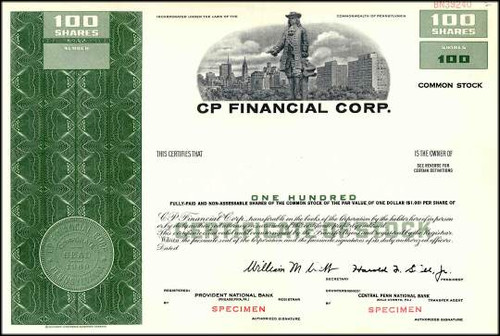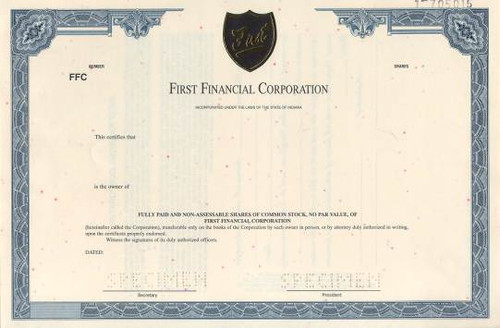Beautifully engraved certificate from the Siebert Financial Corp. This historic document was printed by the Security-Columbian United States Banknote Company and has an ornate border around it with a vignette of the company logo. This item has the printed signatures of the Company's President ( Muriel Siebert ) and Secretary. 
Certificate Vignette Muriel "Mickie" Siebert, (September 12, 1932 - August 24, 2013) was known as The First Woman of Finance, and the first woman to own a seat on the New York Stock Exchange. She was also the first woman to head one of its member firms. Her struggle to obtain that seat, and join the 1365 male members of the exchange, occurred on December 28, 1967. Siebert began her career working at various brokerages.[1] In 1967, she founded her own eponymous firm, Muriel Siebert & Co., Inc., beginning by doing research for institutions, and buying and selling financial analyses. That same year, she applied for a seat on the New York Stock Exchange. Despite her experience and success (she had been a partner at two leading brokerages, Finkle & Co. and Brimberg and Co., and earned large sums for colleagues), she met with ridicule and hostility. Among the first ten men she asked to sponsor her application, nine denied her. In addition, the NYSE itself insisted on a new condition before considering Siebert's application. It insisted that Siebert obtain a letter from a bank offering loans of $300,000 on the near-record $445,000 seat price. But banks would not commit to lend her the money until the NYSE would agree to admit her. It took many months to overcome this double-bind and find the needed bank loans and sponsors. Siebert finally was elected to membership on December 28, 1967. In 1975, when the Securities and Exchange Commission first permitted broker commissions to be negotiable, she criticized the discount brokers vehemently; she ran numerous ads calling the discounters and the rates "low ball". In 1977, she was named Superintendent of Banks for the State of New York, with oversight of all of the banks in the state, regulating about $500 billion. Not one bank failed during her tenure, despite failures nationwide. Shortly after returning to her firm, she ran in the Republican primary for the Senate seat of Daniel Patrick Moynihan. She finished second behind State Assemblywoman Florence Sullivan, who went on to lose to Moynihan in November 1982. In the mid-1990s, Siebert & Co. merged into a furniture holding company, J. Michael & Sons, that was liquidating, thereby becoming a publicly traded company. Siebert remained President of her eponymous firm, and continued to comment on phenomena in financial markets. Siebert has spoken as an advocate for women in industry. For example, "American business will find that women executives can be a strong competitive weapon against Japan and Germany and other countries that still limit their executive talent pool to the male 50 percent of their population."[3] Additionally, "The men at the top of industry and government should be more willing to risk sharing leadership with women and minority members who are not merely clones of their white male buddies. In these fast-changing times we need the different viewpoints and experiences, we need the enlarged talent bank. The real risk lies in continuing to do things the way they've always been done."[3] In 1990, she created the Siebert Entrepreneurial Philanthropic Plan, through which she shares half of her firm's profits from new securities underwriting with charities of the issuers' choices. The program offers buyers of new securities a chance to help charities in their communities. Through 2006, more than $5 million has been contributed through this program. She served as president of the New York Women's Agenda in 1998. During her term NYWA developed a program advocating "Financial Literacy for Women", which continued until her death. In honor of Siebert's 30th anniversary on the New York Stock Exchange, she rang the closing bell on January 5, 1998. Likewise, on December 28, 2007, exactly 40 years after her election to the membership of the New York Stock Exchange, she rang the closing bell in celebration. Siebert was a member of the National Women's Hall of Fame, and was interviewed in the 2003 documentary Risk/Reward. She has been awarded 17 honorary doctorates. Siebert was inducted into the Junior Achievement U.S. Business Hall of Fame in 2009. She was honored at Wagner College during the 123rd Graduation Ceremony on May 21, 2010, with an Honorary Doctorate. Siebert was born in Cleveland, Ohio on September 12, 1932. She attended Western Reserve University (now Case Western Reserve University) from 1949 until 1952. Siebert never married and did not have any children. On August 24, 2013, Siebert died from complications from cancer at Memorial Sloan-Kettering Cancer Center in New York City. She was 80. Siebert Financial Corp. was a holding company, which conducts all its operations through its wholly owned subsidiary, Muriel Siebert & Co., Inc. A member of the New York Stock Exchange, Siebert was one of the first stock brokerage firms in the U.S. to adopt a discounted commission schedule on May 1, 1975, when discounting was first permitted. Siebert conducted its municipal investment banking activities through Siebert, Brandford, Shank & Co., LLC, a separate affiliate specializing in municipal and financial advisory services. Siebert was based in New York City with additional retail branches in Boca Raton, Palm Beach, Surfside and Naples, Fla.; Beverly Hills, Calif., and Jersey City, N.J. In addition, Siebert, Brandford, Shank & Co. had offices in New York City, San Francisco, Los Angeles, Seattle, Houston, Chicago, Detroit and Dallas.
January 29, 2021 - Short Squeeze GameStop Corp. and AMC Entertainment Inc. shares burst out of the gate Friday and both finished for their best week ever as an army of social-media rallying retail investors sought to take on established Wall Street firms. GameStop GME, +19.20% shares leapt 113% to an intraday high of $413.98, and closed Friday up 68% at $325.00. AMC shares surged 85% to $16.00 at Friday's open and closed up 54% at $13.26. Friday gains overcame Thursday's losses when several online trading platforms started restricting trades of the volatile stocks. That turned around late Thursday when online trading platform Robinhood said it would allow limited buying of volatile stocks for now. By Friday's close, more than 49 million shares of GameStop had exchanged hands. That's less than the 10-day average daily volume of 91.8 million, but more than the 52-week average daily volume of 10.8 million. AMC share volume was even more pronounced, trading more than 589 million shares by the close, compared with a 10-day average of 367.8 million and a 52-week daily average of 25.5 million shares. GameStop's share price has jumped 400% on the week, while AMC's share price has surged 278%, notching the best performing weeks ever for both stocks. The frenzy for buying up downtrodden stocks hasn't just been limited to GameStop and AMC. Siebert Financial Corp. SIEB, which had been halted several times Friday, more than tripled out of the gate on no news, and finished Friday up 122% at $8.22. A short squeeze occurs when a stock or other asset jumps sharply higher, forcing traders who had bet that its price would fall, to buy it in order to forestall even greater losses. Their scramble to buy only adds to the upward pressure on the stock's price. History from OldCompany.com, Wikipedia and SavingsBonds.pro (collectible Savings Bonds website)

Certificate Vignette
January 29, 2021 - Short Squeeze GameStop Corp. and AMC Entertainment Inc. shares burst out of the gate Friday and both finished for their best week ever as an army of social-media rallying retail investors sought to take on established Wall Street firms. GameStop GME, +19.20% shares leapt 113% to an intraday high of $413.98, and closed Friday up 68% at $325.00. AMC shares surged 85% to $16.00 at Friday's open and closed up 54% at $13.26. Friday gains overcame Thursday's losses when several online trading platforms started restricting trades of the volatile stocks. That turned around late Thursday when online trading platform Robinhood said it would allow limited buying of volatile stocks for now. By Friday's close, more than 49 million shares of GameStop had exchanged hands. That's less than the 10-day average daily volume of 91.8 million, but more than the 52-week average daily volume of 10.8 million. AMC share volume was even more pronounced, trading more than 589 million shares by the close, compared with a 10-day average of 367.8 million and a 52-week daily average of 25.5 million shares. GameStop's share price has jumped 400% on the week, while AMC's share price has surged 278%, notching the best performing weeks ever for both stocks. The frenzy for buying up downtrodden stocks hasn't just been limited to GameStop and AMC. Siebert Financial Corp. SIEB, which had been halted several times Friday, more than tripled out of the gate on no news, and finished Friday up 122% at $8.22. A short squeeze occurs when a stock or other asset jumps sharply higher, forcing traders who had bet that its price would fall, to buy it in order to forestall even greater losses. Their scramble to buy only adds to the upward pressure on the stock's price. History from OldCompany.com, Wikipedia and SavingsBonds.pro (collectible Savings Bonds website)








